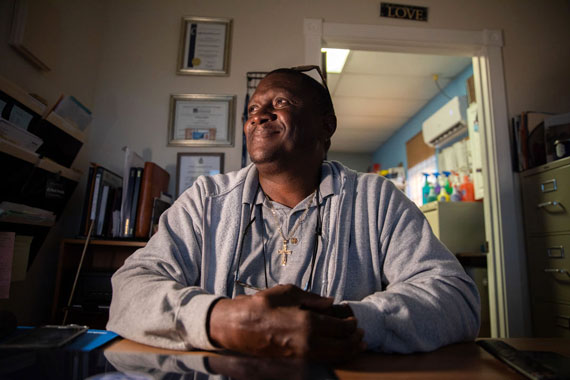
This month marks the one year anniversary of Hurricane Dorian — the most powerful storm to ever hit the island nation of The Bahamas. Within hours, Abaco and Grand Bahama Islands were decimated and thousands of Bahamians were left without food, water, shelter, power or medical supplies. The challenge for The Bahamas at this one year milestone after Dorian is complex, with an approaching hurricane season during the height of the coronavirus pandemic. Yet in many ways, our year of work and partnership has uniquely prepared us for this moment. As we address hurricane recovery, storm season preparation plus COVID‑19, two of our top priorities remain the same as a year ago: clean water and job recovery.
Access to clean water is at the center of many of our projects across the world. In our role as a connector, we collaborate with people to build sustainable solutions for recovery that make sense for the people we serve. That’s why partnership with local leadership and other organizations is key to our work in The Bahamas. When Dorian contaminated the water aquifer, we partnered with Mission Resolve to install a reverse osmosis water treatment system — turning saltwater into freshwater — with the goal of helping local water systems and suppliers get back on their feet. This July marked a moment of success, when we transferred management of the water distribution points — which were supplying 15,000 gallons of fresh drinking water per day — to the Grand Bahama Utility Company. As of September 1, the quality of the island’s municipal water supply is finally on track to being fully restored. The utility has announced that 70% of households’ water is no longer salty and can be safely used to drink and cook with again. The remaining 30% will receive water through the utility’s own technology and wellfield until the aquifer restoration is complete. After addressing immediate needs like food, energy, and water supply in those first days and months after the storm, we took on the job of helping with long-term economic recovery. This support is even more important today, as small businesses — especially those dependent on tourism to survive — struggle through the crisis of COVID‑19.
We’re providing emergency relief grants to micro, small and medium businesses affected by the pandemic to help them pay for recurring expenses while they’re unable to open for business and generate revenue. We continue to provide access to our online mentoring platform, MicroMentor, for entrepreneurs to connect with experts who can help them pivot to new opportunities and business models that make sense in the current landscape. 
Dorian damaged Jonathan’s office and destroyed most of his equipment, but with a small business grant from Mercy Corps, he was able to get his business up and running and his staff back to work.
The risks and challenges for the people of The Bahamas are still great, and the future — with extreme weather events, a pandemic and an unstable global economy — remains unclear for us all. With the help of humanitarians like you, a powerful model has been built over the past year. In The Bahamas and worldwide, we are providing stronger, more sustainable systems for the life and livelihoods of families and small business owners facing crisis and its long-term effects. With gratitude,
Mercy Corps Country Director, The Bahamas For over a decade, Paula has led programs in livelihood, disaster preparedness, water, sanitation and health. She believes the Bahamian team is at the heart of helping people recover and build resilience. |
| STAY CONNECTED |
|---|
|
||||||